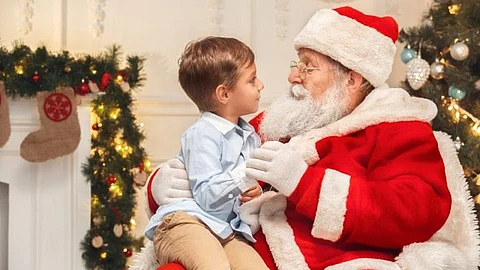
- Home
- Live Blog
- Breaking News
- Top Headlines
- Cities
- NE News
- Sentinel Media
- Sports
- Education
- Jobs

Children around the world believing in Santa Claus around the age of 8, according to an international survey which also showed that about 34 per cent of adults wished that they still believed in Father Christmas.
The study also shows the threat of being on Santa’s naughty list doesn't work for several youngsters, and many youngsters continue to pretend they believe in Father Christmas even when they know he does not exist. Psychologist Professor Chris Boyle, from the University of Exeter in the UK, asked individuals around the world to inform him however they changed their minds regarding Santa, and if learning that he's rough as he appears had affected their trust in their folks.
Boyle received1,200 responses from all around the world to his The Exeter Santa Survey, the sole international study of its kind, primarily from adults reflective on their childhood reminiscences. The findings show that 34 percent of individuals wished that they still believed in Santa with 50 percent quite content that they not believe.
Around 34 percent of those who took part in the survey aforementioned believing in Father Christmas had improved their behaviour as a child whilst 47 per cent found it did not. The average age when children stopped believing in Father Christmas was 8, according to the study.
About 65 percent of individuals had played along with the Santa story, as youngsters, even they knew it absolutely was not true. A third of respondents aforementioned that they had been upset when they discovered Father Christmas was not real, while 15 per cent had felt betrayed by their parents and ten per cent were angry.
Around 56 per cent of respondents said their trust in adults hadn’t been affected by their belief in Father Christmas, while 30 per cent said it had. A total of 31 per cent of parents said they had denied that Santa is not true when directly asked by their child, while 40 per cent had not denied it if they are asked directly. About 72 per cent of parents are quite happy telling their children about Santa and playing along with the myth, with the rest choosing not to.
“During the last two years I have been overwhelmed by people getting in touch to say they were affected by the lack of trust involved when they discovered Santa wasn’t real,” said Boyle.
“It has been fascinating to hear why they started to believe he is fictional. The main cause is either the accidental or deliberate actions of parents, but some children started to piece together the truth themselves as they became older,” he said. “As much as this research has a light-hearted element, the responses do show a sense of disappointment and also amusement about having been lied to,” he added.
Also Read: Pre-Christmas celebrated in Jorhat